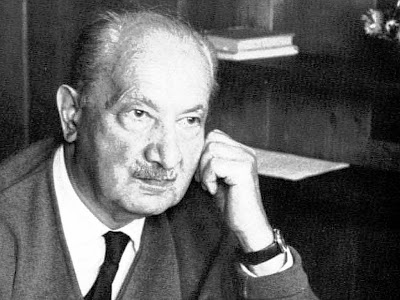
Martin Heidegger
"Why are there beings at all instead of nothing? That is the question. Presumably it is not an arbitrary question, "Why are there beings at all instead of nothing?" - this is obviously the first of all questions. Of course it is not the first question in the chronological sense. And yet, we are each touched once, maybe even every now and then, by the concealed power of this question, without properly grasping what is happening to us. In great despair, for example, when all weight tends to dwindle away from things and the sense of things grows dark, the question looms." - Martin Heidegger, from Being and Time
Wiki says:
Martin Heidegger (September 26, 1889 – May 26, 1976) was an influential German philosopher known for his existential and phenomenological explorations of the "question of Being." His best-known book, Being and Time, is considered to be one of the most important philosophical works of the 20th century and he has been influential beyond philosophy, in literature, psychology, and artificial intelligence. Heidegger remains controversial due to his involvement with Nazism and statements in support of Adolf Hitler.
Heidegger claimed that Western philosophy since Plato has misunderstood what it means for something "to be", tending to approach this question in terms of a being, rather than asking about Being itself. In other words, Heidegger believed all investigations of being have historically focused on particular entities and their properties, or have treated Being itself as an entity, or substance, with properties. A more authentic analysis of being would, for Heidegger, investigate "that on the basis of which beings are already understood", or that which underlies all particular entities and allows them to show up as entities in the first place (see world disclosure). But since philosophers and scientists have overlooked the more basic, pre-theoretical ways of being from which their theories derive, and since they have incorrectly applied those theories universally, they have confused our understanding of being and human existence. To avoid these deep-rooted misconceptions, Heidegger believed philosophical inquiry must be conducted in a new way, through a process of retracing the steps of the history of philosophy.
Heidegger argued that this misunderstanding, beginning with Plato, has left its traces in every stage of Western thought. All that we understand, from the way we speak to our notions of "common sense", is susceptible to error, to fundamental mistakes about the nature of being. These mistakes filter into the terms through which being is articulated in the history of philosophy—such as reality, logic, God, consciousness, and presence. In his later philosophy, Heidegger argues that this profoundly affects the way in which human beings relate to modern technology.
Heidegger's work has strongly influenced philosophy, theology and the humanities. Within philosophy it played a crucial role in the development of existentialism, hermeneutics, deconstructionism, postmodernism, and continental philosophy in general. Well-known philosophers such as Karl Jaspers, Leo Strauss, Ahmad Fardid, Hans-Georg Gadamer, Jean-Paul Sartre, Emmanuel Lévinas, Hannah Arendt, Maurice Merleau-Ponty, Michel Foucault, Richard Rorty, William E. Connolly, and Jacques Derrida have all analyzed Heidegger's work.
Heidegger supported National Socialism and was a member of the Nazi Party from May 1933 until May 1945. His defenders, notably Hannah Arendt, see this support as arguably a personal " 'error' " (a word which Arendt placed in quotation marks when referring to Heidegger's Nazi-era politics). Defenders think this error was largely irrelevant to Heidegger's philosophy. Critics, such as his former students Emmanuel Levinas and Karl Löwith, claim that Heidegger's support for National Socialism revealed flaws inherent in his thought.
**********
There are the big things in my life. Even at this point, I really don't know what to make of them. I know the illusions I followed. I know what I wanted but that was never possible. Three times I tried. Instead I have the life of the possible. That is all right with me. I am all right.
Why Do I Do This
You tell me to check
so I look in all the back
rooms, in the boxes
I stashed there, looking
for motives, hidden behind
the obvious ones.
Out of the corner
of my eye something scurries
along the wall, dives
into that small hole
and refuses to come out,
not even for you.
That is, you say, the main motive.
February 2, 2009 2:42 PM
First Posted August 2, 2009






Er war ein Faschist, kein Zweifel. Es gibt Unkraut aus dem Boden existentielle sowie Obstbäume.
ReplyDeletethis post and the previous three all have this wonderful sense of being and time... so heidegger is apt here in this one.
ReplyDeletein one of my previous lives i studied heidegger, and, in particular, being and time. it's an adventure.... no matter how many times i read it, there is more given each time. it is an important book ...
you have done a wonderful job here giving heidegger a context and describing his project.... with all its quirks, difficulties and flaws.
and the poem is marvelous... a phenomenological rendering in the best sense.
Ghoost :D Er war ein Ghoost! I bow.
ReplyDeleteHarlequin, I never went deeply into Heidegger but anyone who lives in the world of modern philosophy owes a debt to him for his relentless remembrance of the whole.
Philosophers go too far into the head sometimes, where the formal languages of logic lead. It is essential to remember the body, to remember history, and to deal with the very real ties of one being to all others. These ties are real in the present and real throughout all time.
I have a feeling that at least Heidegger lived out his best guess of what that must mean to him, much as we vow to marry "for better or for worse, for richer and for poorer, in sickness and in health." It is the modern way to void the vow. It may not have been his way.